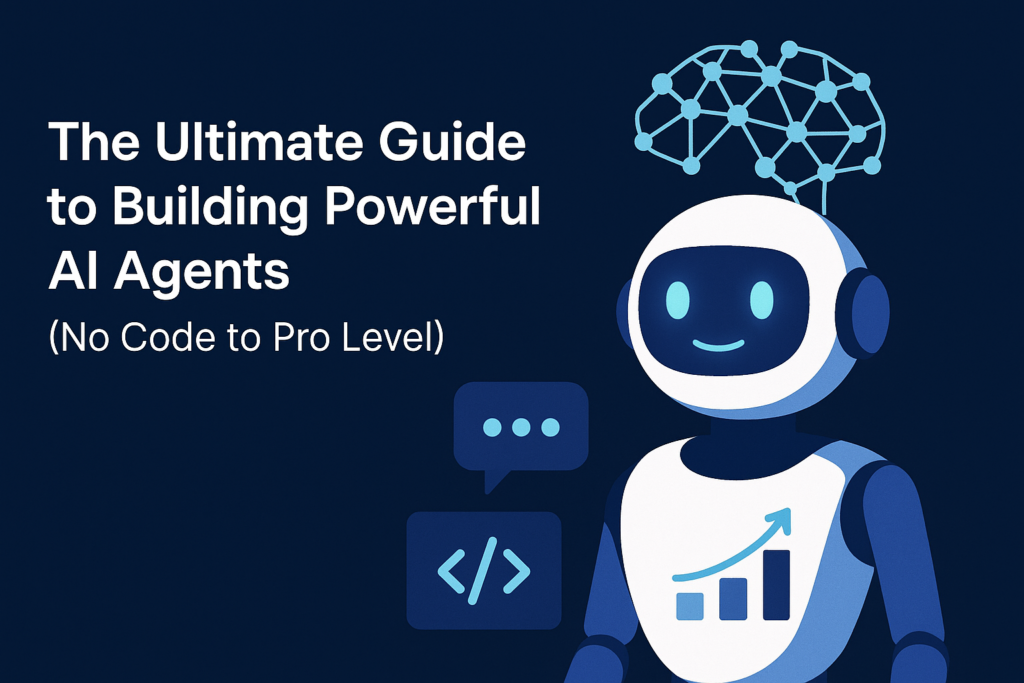The Ultimate Guide to Building Powerful AI Agents (No Code to Pro Level)

Introduction
AI agents are rapidly reshaping the way we work and build businesses. Whether you’re a non-coder exploring no-code platforms or a seasoned developer wanting to launch your next AI startup, building an AI agent today is easier and more powerful than ever. This guide unpacks the essential frameworks, tools, and workflows you need to build smart, reliable AI agents—from simple automation bots to multi-agent systems that can act autonomously.
What Is an AI Agent?
An AI agent is a system that perceives its environment, processes inputs, and takes autonomous action to accomplish specific goals. Think of it as a digital counterpart to human roles—like a customer service rep, financial analyst, or virtual assistant.
Agents can be:
-
Simple chatbots
-
Code generation bots
-
Research assistants
-
Expense trackers
-
Fully autonomous problem-solvers
Each AI agent typically includes smaller sub-agents that handle specific tasks and work together in a larger workflow.
Core Components of an AI Agent
Like a burger needs buns, a patty, and condiments—AI agents need these six essential components:
1. Models
These are your large language models (LLMs) like:
-
GPT-4.0, GPT-4.5 (OpenAI)
-
Claude 3.7 (Anthropic)
-
Gemini 2.5 Pro (Google)
Pick your model based on:
-
Reasoning needs
-
Cost efficiency
-
Speed
-
Context window
2. Tools
These allow the agent to take action:
-
Web search tools
-
File access
-
Integration with apps (Gmail, Zapier, Slack)
-
MCP protocol for standardizing tool use
3. Knowledge & Memory
-
Static memory: Stores facts, documents, and policies
-
Persistent memory: Tracks past interactions for personalization
4. Audio & Speech
-
Voice interfaces (e.g., 11 Labs)
-
Transcription tools (e.g., Whisper)
5. Guardrails
Ensures your AI doesn’t go rogue:
-
Use LangChain Guardrails or Guardrails AI
-
Filter inappropriate or off-topic responses
6. Orchestration
Manages:
-
Sub-agent workflows
-
Deployment and monitoring
-
Performance optimization over time
Top AI Agent Workflows
1. Prompt Chaining
Breaks tasks into a series of sub-steps. Ideal for:
-
Report generation
-
Content writing
-
Summarization workflows
2. Routing
Routes user queries to the right agent based on category. Perfect for:
-
Customer service bots
-
Ticketing systems
3. Parallelization
Runs subtasks simultaneously. Useful for:
-
Voting systems
-
Performance evaluations
4. Orchestrator-Worker
Dynamic task assignment. Used in:
-
Coding agents
-
Research agents
5. Evaluator-Optimizer
Self-improving loop. Best for:
-
Translation agents
-
Iterative content refinement
6. Fully Autonomous
Agent learns and reacts independently. Great for:
-
Complex, undefined tasks
-
Real-time environment interactions
Prompt Engineering for AI Agents
Prompt = brain of the agent. A great prompt includes:
-
Role – Define behavior:
“You are a financial assistant that responds in a formal tone…” -
Task – Be specific:
“Summarize the latest AI news into a 300-word report.” -
Input – Define what it receives:
“User provides a search term or PDF.” -
Output – Define what it returns:
“Give a bulleted summary with source links.” -
Constraints – What NOT to do:
“No fluff or personal opinions.” -
Capabilities – Tools and reminders:
“You have access to web search. Be aware of the current date.”
Tip: Put most important reminders last in your prompt for better performance.
Real-World AI Agent Examples
Here are working agents built using n8n and OpenAI SDKs:
1. Customer Support Agent (Routing Workflow)
-
Routes billing, tech, or general issues
-
Escalates to Discord if needed
-
Uses OpenAI model for classification
2. News Aggregator (Parallel Workflow)
-
Fetches news from newsletters and Reddit
-
Summarizes into a WhatsApp message daily
-
Built with n8n + Whisper for citation and clarity
3. Daily Expense Tracker (Multi-Input Agent)
-
Tracks via WhatsApp messages, images, or receipts
-
Stores data in Google Sheets
-
Summarizes spend report every night
4. Financial Research Assistant (Coded, Prompt Chaining + Routing)
-
Plans, searches, analyzes risk/financials
-
Writes report and verifies it
-
Includes voice and language translation features
How to Decide What AI Agent to Build
Don’t chase hype—solve real problems.
Ask yourself:
-
What do I already do repeatedly that can be automated?
-
What would save me 10+ hours a week?
If you’re a student or new to work:
-
Shadow professionals
-
Identify repetitive or manual tasks
-
Build agents to streamline them
Pro Tip:
Every successful SaaS product has an AI agent equivalent.
Think: “What if ChatGPT replaced this SaaS?”
Tech Innovations Driving AI Agents
🔊 Voice Agents:
-
Tools like 11 Labs and OpenAI SDK enable smooth, natural voice interactions.
-
Ideal for customer support, education, and accessibility.
🎨 Image/Video Agents:
-
Gemini Flash and GPT-4.0 Vision offer top-tier image input/output.
-
Sora and other video models enable storytelling, ad creation, and animation.
⚙ Tool Use (MCP):
-
The Model-Context Protocol simplifies adding tools to your agent.
-
Think of it like a plug-and-play system for AI capabilities.
Final Thoughts and Takeaways
AI agents aren’t just futuristic—they’re here now. Whether you’re automating your daily tasks, launching a side project, or creating a full-on startup, building AI agents gives you a massive edge.
Start small. Start now. Build something that solves a real need.
FAQs
What is the best no-code tool for building AI agents?
N8N is one of the best no-code/low-code tools to build agentic workflows with webhooks, email, and integration support.
Do I need to know how to code?
No! Many tools like N8N, Zapier, and Make.com let you build functional AI agents without writing code.
Which model should I use for AI agents?
Start with GPT-4.0 for deep reasoning or Claude 3.7 for STEM-heavy tasks. Use smaller models like GPT-3.5 or Gemini Flash for faster, cheaper tasks.
Can AI agents replace human jobs?
Not entirely—but they can offload repetitive work and enhance human productivity massively.
What are the top industries for AI agent startups?
Customer service, education, legal, finance, sales, healthcare, and real estate are ripe for AI agent-based disruption.